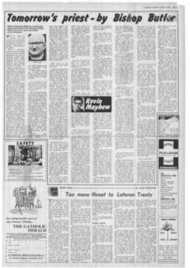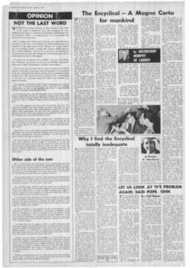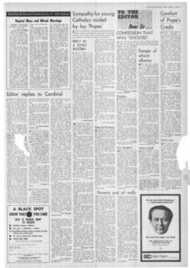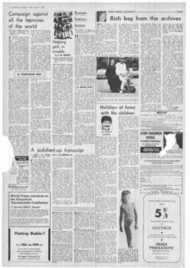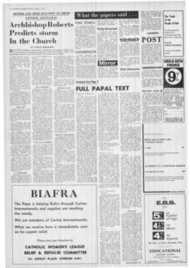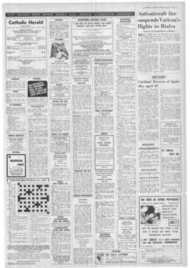Page 4, 2nd August 1968
Page 4
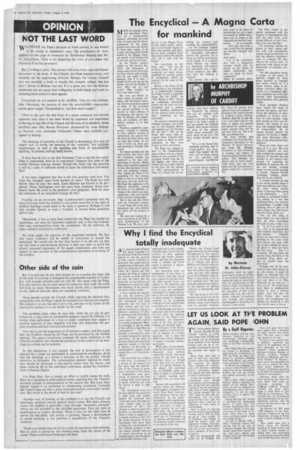
Report an error
Noticed an error on this page?If you've noticed an error in this article please click here to report it.
Tags
Share
Related articles
Tried And Trusted Formula Catechism Pleases The Pope
Vatican Ii A Milestone
A Staff 'reporter Looks Back On A —
Ope Of The Space-age
Letters From Vatican City
LET US LOOK AT TEE PROBLEM AGAIN, SAID POPE IOHN
By a Staff Reporter
THE birth-control debate started officially for the Catholic Church in 1963, when Pope John XXIII took the matter out of the hands of the bishops at the Vatican Council and set up a sixmember Commission to study the question and report to him.
When Pope John died in June of that year the Cornmission's work was unfinished. His successor, the present Pope, enlarged the Commission to 60 members, including doctors, sociologists. population experts and other laymen as well as theologians.
At first the members of the Commission were divided fairly equally into three groups. One group held that periodic continence was the only acceptable form of birth regulation. The second thought that the "pill" might be used with discrimination, and the third group felt that if the "pill" was approved there could be no objections to other forms of contraception.
After a series of meetings the Commission became deeply divided. and in 1966 the Pope set up an "inner cabinet" of 16 Cardinals and bishops to guide the experts' work. He appointed Cardinal Ottaviani, then head of the Holy Office and one of the most conservative members of the Curia. to head it.
But the disagreement still could not be bridged. The
liberal majority and the conservative minority on the Commission submitted separate, conflicting recommendations to the Pope on June 26. 1966.
Since Pope John first opened the matter to discussion by appointing his Commission in 1963 the Pope has been subjected to constant lobbying from both liberal and conservative elements in the Church.
In Britain the campaign for a change in the Church's strict ruling was led by Archbishop Roberts. Si., who has written and spoken constantly on the subject.
But in May, 1964. Cardinal Heenan issued a statement on behalf of the British Hierarchy. In this he declared, in unambiguous terms. that contraception "is not an open question for it is against the law of God."
Saying that they felt "bound to proclaim the unchanging nature of God's law," the bishops maintained that they would be failing in their pastoral duty if they were to 'remain silent when so many voices are being raised to lead our people astray."
As early as March. 1965. a Daily Telegraph Gallup Poll showed that 60 per cent of Catholics thought the Church should allow birth control. 19 per cent were against any change arid 21 per cent thought it did not matter. Time and again there have been reports that a statement on birth control was imminent. The last, only a week ago, proved to be true.
In June it was reported that a definitive statement was about to be published. but it was, suppressed at the last moment. Three progressive bishops—Cardinal Koenig of Vienna, Cardinal Suenens, Primate of Belgium. and Cardinal Dopfner of Munich— were said to have pleaded with him not to publish the document which reaffirmed the Church's traditional opposition to all forms of mechanical and chemical contraception.'
Rumours about what the Pope would say have been rife since April, 1967, when the American newspaper the National Catholic Re porter "leaked" the secret report made to Pope Paul in June 1966 by his Commisson. This revealed that the Commission had recommended, by an over-, whelming majority, that the Church should end its ban on contraceptives.
On October 18. 1967. some 3.000 delegates to the International Congress. of the Lay Apostolate. meeting in Rome, made a direct challenge to the Pope.
They called upon him to firmly restate the Church's teaching on birth control and to allow Catholic couples to follow their own consciences in selecting the means by which they would limit their families.
blog comments powered by Disqus




